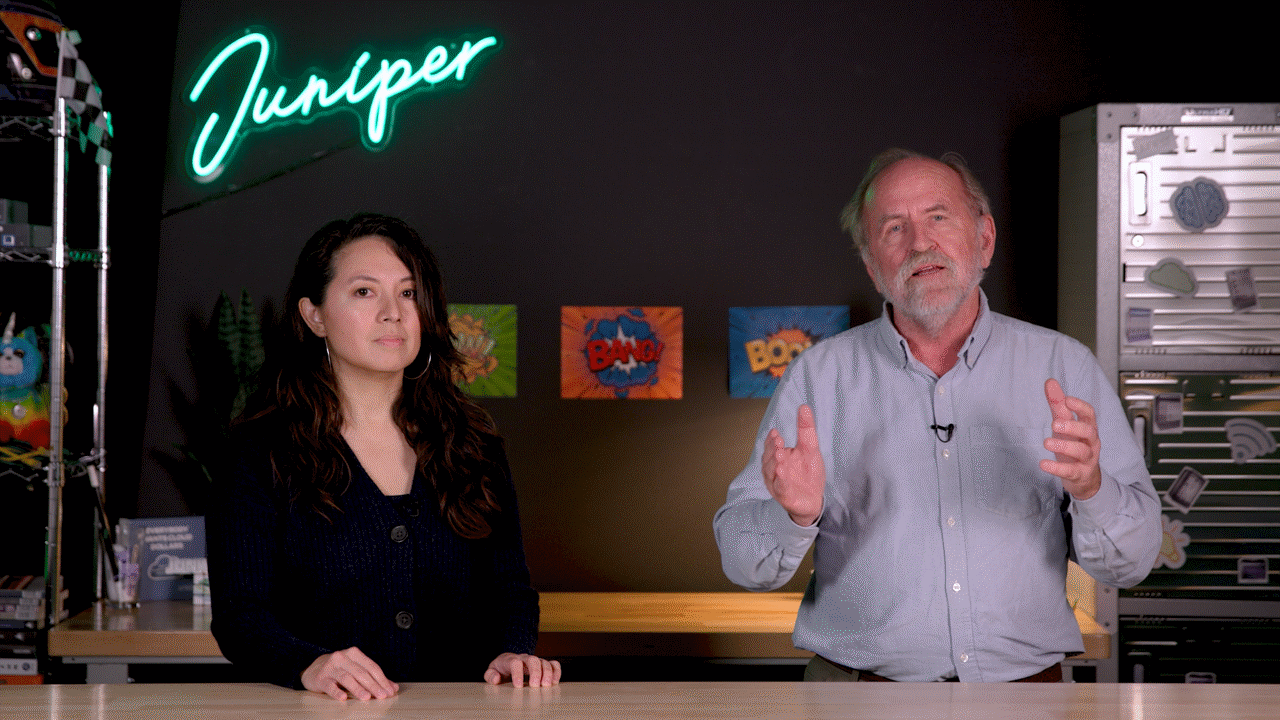Silicon Built for the Future: Juniper Optimizes Silicon for Edge and Core Network Deployments


The future of silicon is purpose-built
With the constant emergence of new services and unrelenting growth in traffic, demand, and user expectations, how can service providers ensure that the decisions they make today will carry them for the next decade — or longer? Juniper’s Sally Bament and Brendan Gibbs share some solutions.
You’ll learn
How Juniper’s strategy is focused on purpose-built silicon optimized for the diverse and demanding challenges of different points in the network
Why purpose-built silicon for edge and core network deployment is needed now more than ever before
The groundbreaking new capabilities of the new silicon innovations along with a series of new products just introduced into the market
Who is this for?
Host

Guest speakers

Transcript
00:00 [Music]
00:08 hello everyone thank you for joining
00:09 today and my name is sally bayman i am
00:11 vice president of marketing at juniper
00:13 networks and today we're going to talk
00:15 about our latest uh generation of custom
00:19 silicon innovations designed for the
00:21 world's next generation networks we're
00:24 going to discuss juniper strategy
00:26 focused on purpose-built silicon
00:29 optimized for the very diverse and
00:31 demanding challenges of different points
00:34 in the network
00:35 and why that's needed now more than ever
00:37 before and we're also going to share
00:39 some of the groundbreaking capabilities
00:41 of the new silicon innovations along
00:43 with a series of new products that we're
00:46 introducing the markets starting today
00:48 and joining me today to discuss this
00:50 exciting topic is brendan gibbs the
00:52 leader of our automated one solutions
00:55 business brendan always a pleasure and
00:57 thank you for joining
00:59 hey sally thanks for having me i'm
01:00 thrilled to be here
01:02 fantastic and um and brandon i will set
01:04 a little bit of context for this
01:06 discussion because it's quite exciting
01:08 we know that networks have become a
01:10 vital business enabler
01:12 particularly in this highly connected
01:14 global economy you know pretty much any
01:17 relevant business process today is
01:19 enabled by network technology in some
01:21 way and it's also where service provider
01:23 revenues are minted and as such we in
01:26 particular place pace a place that pay
01:29 very close attention to any factors
01:32 driving the evolution of the networks
01:35 and one thing we can say particularly
01:36 for service provider networks is change
01:38 is constant
01:40 we see the emergence of new services we
01:42 talk about ar vr iot
01:46 smart cities and of course 5g
01:48 deployments enabling new services some
01:50 of which we don't even know about yet
01:52 and of course the pandemic also
01:54 highlighted continued change
01:56 and the need to plan for not just the
01:58 known but also the unknown
02:01 we also see continued exponential growth
02:03 in traffic from digitalization from
02:06 cloudification
02:08 work from home video growth you name it
02:10 and that's driving increased speeds
02:13 increased throughput and bandwidth
02:15 demands across the entire network
02:17 and then thirdly increased expectations
02:20 from network subscribers
02:22 both in terms of a secure experience as
02:25 well as a delightful service experience
02:28 and we know you know service providers
02:29 are making decisions today that have to
02:32 carry them for the next five ten plus
02:35 years so they have to place their bets
02:37 and the choices they're making now have
02:39 to support whatever's coming their way
02:41 in the future
02:43 so with that as the backdrop let's kind
02:45 of discuss how these trends are driving
02:48 the evolution of both service provider
02:51 and hyper scale and network
02:52 architectures
02:54 and let me start brendan by posing you
02:56 know this is a perfect storm
02:58 you know continued exponential growth of
03:00 traffic new services security concerns
03:03 etc
03:04 how is that shaping the evolution of
03:06 network architectures and in particular
03:08 the core of the network and the provider
03:10 multi-service edge
03:12 thanks ali you know i really think those
03:14 are vastly dissimilar requirements and
03:16 one of the strategies that juniper has
03:18 employed to target those is really to
03:21 have the right tool for the job
03:23 because i i think what you'll see when
03:24 you look at the core
03:26 is that you have just a massive amount
03:28 of bandwidth everything it's aggregated
03:30 and transported through the core and so
03:33 sheer bandwidth is going to be paramount
03:35 but also
03:36 bandwidth per power so it is essentially
03:39 the the most efficient ratio of power
03:41 utilization for the capacity offered
03:43 that's a critical component the
03:44 customers really care about and then you
03:47 care about other things like being
03:48 secure
03:49 having accurate telemetry counters etc
03:52 but fundamentally core is marked
03:55 primarily by
03:57 raw bandwidth with the ability to kind
03:58 of have things at right like maxsec
04:01 security at right encounters at rate
04:03 and security filters at rate etc
04:06 in contrast the edge is incredibly
04:09 dynamic um as you said there's
04:12 really a huge growth in not only
04:14 bandwidth but also subscribers uh i mean
04:17 let's be honest i'm working from home
04:19 right now it's expected that the work
04:21 from home scenario is going to persist
04:23 even when the pandemic is over let's
04:25 hope that the pandemic is over pretty
04:27 darn soon
04:28 there may be as much as a third of all
04:30 workers that remain working from home on
04:33 a permanent basis
04:34 so what this means is network traffic
04:36 patterns and architectures are shifted
04:38 almost permanently they were abrupt at
04:40 the beginning of the pandemic and
04:42 they're they're a permanent shift now
04:44 this means increased growth of broadband
04:47 remote access essentially a consumer
04:49 broadband internet high-speed uh
04:52 services with bng
04:53 uh continued broadband uh service
04:56 delivery for business services because
04:58 people are now gonna need to access
05:00 their enterprise public cloud enterprise
05:02 you know private workloads over vpn
05:05 constructs but from their home
05:07 so you now see a model where you need
05:09 massive bandwidth to the home tons of
05:11 simultaneous subscribers and convergence
05:14 of services you'll have essentially on
05:16 one edge box
05:17 b g for consumer broadband
05:19 business vpn for enterprise connectivity
05:22 and mobile backhaul because people want
05:24 the same experience over a 5g mobility
05:28 construct as they also have at their
05:30 home over wireline broadband
05:32 so
05:33 the edge is really then marked by a
05:35 significant
05:37 multi-service aggregation point and
05:39 where the core is all about bandwidth
05:41 and a few services at that bandwidth
05:43 rate
05:44 the edge is marked by a massive growth
05:47 of simultaneous logical scale
05:50 for essentially a service construct for
05:52 multiple simultaneous services uh such
05:55 as business and residential and mobile
05:57 at the same time
05:59 and then service uh
06:01 additions basically tacked onto that
06:03 such as for each logical service
06:05 construct you need to have massive scale
06:07 for qos encounters and security and
06:10 tunnels etc so vastly dissimilar
06:13 requirements and that actually leads all
06:15 the way down into the data plane into
06:17 the silicon engineering for what you
06:19 might require for each
06:21 where you might need tons of memory with
06:23 reasonably high bandwidth for the edge
06:26 you might need less much less memory for
06:28 the core
06:29 but
06:30 really the cutting edge innovation on
06:32 how much raw capacity you can drive
06:34 through the chips so and it's
06:36 essentially like uh you know
06:38 proverbially pushing in on a balloon
06:39 you're pushing on a balloon in one area
06:41 and it pushes out the duck another area
06:43 you can't keep growing logical
06:44 subscriber count and memory databases at
06:47 the same time they're growing raw
06:48 bandwidth so you have to have a
06:50 trade-off you need to make compromises
06:52 and so that's why the network
06:54 architecture demands dissimilar
06:56 treatment and that's why juniper has
06:58 offered multiple different silicon
06:59 offerings to
07:00 know essentially reacts to those
07:02 dissimilar requirements
07:05 makes total sense and i'm glad you
07:07 brought up the you know silicon uh
07:09 designs because you know to be honest
07:12 with you brandon we've seen quite a few
07:14 network silicon announcements recently
07:16 and you know if you were to believe
07:18 those announcements you would assume
07:21 that a single
07:22 silicon design is enough to meet these
07:25 you know uniquely diverging and and uh
07:28 challenging requirements of the core and
07:30 edge
07:31 you've got cisco with silicon one and
07:33 you've got nokia with fp5
07:35 you know if i was to ask you what's your
07:37 reaction and if you can touch upon
07:39 obviously
07:41 you know the specifics with juniper as
07:42 well but what's your reaction to these
07:44 announcements
07:45 well i'm reminded of a quote that's
07:47 attributed to henry ford which is uh he
07:50 said back in the day you can have any
07:51 color you want as long as it's black
07:54 and that's kind of how i feel some of
07:56 the competitive offerings are which is
07:58 that they purport to address all the
08:00 customer requirements
08:02 but only if it's black only if it fits
08:04 into what they've already offered and it
08:06 becomes a one-size-fits-all type of
08:08 approach or uh you know
08:10 jack-of-all-trades so to speak but we
08:12 believe that fundamentally leads to
08:14 being master of none it fundamentally
08:16 means that you try to have uh that one
08:18 size fits all approach which means that
08:20 you're not able to address more of the
08:22 corner cases uh because you're you're
08:24 trying to speak to the to the mass
08:26 audience and nobody gets served properly
08:30 so what
08:31 sorry what are we going to do yeah no go
08:33 ahead i keep going
08:34 well what we were going to uh what i was
08:36 going to say is essentially what would
08:38 juniper believes again as i said before
08:41 is to have a fundamentally optimized
08:43 solution and so we have taken the tack
08:46 uh which honestly is a little bit more
08:48 expensive for for us a little bit more
08:50 effort for us but we think it's better
08:52 serving our customers is to have a
08:55 optimized solution for the edge which is
08:57 what we've delivered with our brand new
08:59 trio six chip the sixth generation of
09:02 our wildly successful trio edge
09:05 optimized silicon
09:06 and we've elected to uh target core and
09:09 peering roles with our express five chip
09:12 uh the fifth generation of the express
09:14 line uh really is part of our ptx
09:16 running portfolio
09:18 they they have different characteristics
09:21 even though they're on the same 70
09:22 nanometer process geometry have widely
09:25 dissimilar scaling and performance
09:28 parameters which is really what you want
09:30 for these type of roles i don't see that
09:32 being done as much from some of our
09:34 competitors and we'll see in the market
09:37 but um i very firmly believe that
09:40 customers are resonating with having an
09:42 optimized solution for their mission
09:44 specific needs yeah i love it and that's
09:47 obviously a powerful combination to
09:50 address the you know diverse
09:51 requirements we just talked about
09:53 express five and and obviously the
09:55 express series is part of our ptx uh
09:58 core routing portfolio and then uh trio
10:01 which as you said sixth generation for
10:03 our mx series products you know brendan
10:06 of course the rubber really hits the
10:07 road when vendors actually start
10:10 shipping products
10:11 instantiated with this custom silicon so
10:15 from a product perspective
10:17 when can our customers expect to see
10:20 products based on either you know
10:22 express 5 or the new 306 silicon
10:27 so for express 5 right now it's a
10:29 silicon only announcement
10:31 products that will ship with express5
10:34 integrated with them will be in a future
10:35 date and the reason we opted to announce
10:38 the silicon today is because our
10:40 customers have such high growth of
10:42 bandwidth requirement they really wanted
10:44 to have that comfort factor that they
10:46 would make a bet on a platform and there
10:48 would be a long-term trajectory for it
10:50 not all of our competitors are as good
10:52 at being
10:53 out with rapid silicon or about
10:55 investment protection as juniper is
10:58 we're leading today with our ptx 10k in
11:02 the 400 gig generation for core routing
11:04 deployments the express 5 is really
11:07 architected for leading in the 800 gig
11:09 inflection point with 100 gigs 30s 112
11:12 technically but it's 100 gig service
11:14 type generation and so we have a silicon
11:16 only announcement really to tell our
11:18 customers we got you
11:20 we have perfect solutions with
11:22 leadership deployments today already for
11:24 400 gig you'll have that comfort that
11:27 you're protected for the future
11:29 now in contrast 306 is here now it's
11:32 already available um it's it's available
11:34 now on a brand new line card for the mx
11:37 10000 platform which gives us the
11:39 ability to scale from one gig all the
11:41 way up to 400 gig with full investment
11:44 protection and parity for years worth of
11:47 mx classic features
11:50 we've also got a couple platforms that
11:51 will be available uh later this year
11:53 maybe around the middle of the year
11:55 which are first of all an mx 1004
11:58 platform
11:59 that will be essentially a four slot
12:02 chassis variant that supports all the
12:03 same line cards including the brand new
12:06 306 baseline card just in a smaller form
12:08 factor with sports slots
12:10 and we've also got an mx304 platform and
12:13 that platform is really intended to be a
12:15 small form factor system
12:17 very cute but very high performance
12:20 again with all of the investment
12:21 protection for the trio feature set in a
12:24 very space optimized price optimized and
12:27 especially power optimized package
12:30 with 70
12:31 power savings over the prior generation
12:33 of trio chip
12:35 that's a lot actually a lot of products
12:37 hitting the market very exciting brendan
12:39 listen you know i just want to thank you
12:42 as always for sharing your vision and
12:43 also the details behind some of these
12:46 new product capabilities if i were to
12:48 you know quickly recap obviously we
12:50 believe in these
12:51 uniquely diverse challenges uh we've
12:54 built specialized silicon from the
12:56 ground up to support that and at juniper
12:59 just as we've done with the past two
13:00 decades we're delivering groundbreaking
13:03 products that instantiate these new
13:05 custom silicon innovations today
13:08 and um this announcement i think really
13:10 propels our leadership in the core and
13:12 the multi-service edge and as you said
13:15 with the right tool for the job very
13:17 much in contrast to other vendors
13:20 with their compromised single silicon
13:23 designs so it's what we know obviously
13:25 and what we know at juniper so listen
13:27 for all those listening in i want uh
13:30 first of all thank everyone please visit
13:33 juniper.net if you go to our service
13:35 provider or cloud operator solutions
13:37 pages you'll find a lot more information
13:40 about what we talked about today and i
13:42 specifically want to thank you brendan
13:44 thanks again this has been fantastic i
13:46 appreciate your time thank you sally
13:53 [Music]






















